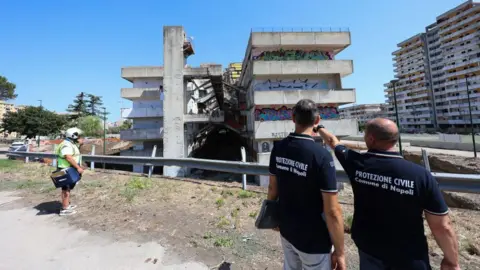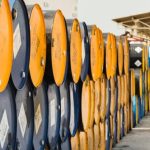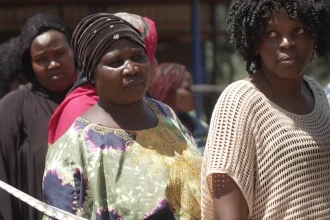Two people were killed and 13 others injured when a walkway collapsed on a council estate which has become synonymous with Naples mafia drug wars.
Several members of the same family were reportedly getting some fresh air on a sweltering night when the third-floor walkway connecting two sections of a building on the dilapidated Scampia estate crumbled beneath their feet.
One of the residents, Vincenza Troise, said she was having dinner “with the door wide open because it was so hot when suddenly we heard a loud roar, like an earthquake”.
The victims were named locally as 29-year-old Roberto, a butcher and the father of a two-year-old girl, and his aunt Margherita, 35, who had three children.
Of the 13 people hurt, seven were children aged between two and eight years old. Two of the younger children are described as in a critical condition.
More than 800 people were evacuated from the estate overnight.
Several residents told Italian media that they blamed the accident on ongoing building work on the estate. “Every morning you can feel the vibrations from the jackhammers and you see rocks tumbling down,” one woman told state broadcaster Rai.
Prosecutors in Naples have opened an investigation for manslaughter.
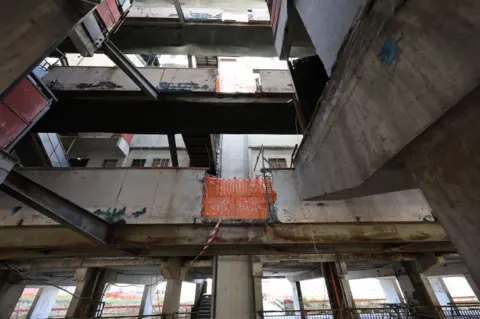 Getty Images
Getty ImagesItalian Prime Minister Giorgia Meloni said on X that she was “distressed” by what had happened and offered her condolences to the families of the victims.
The Scampia estate to the north of Naples was built in the 1960s, at the height of Italy’s postwar economic boom.
Made up of seven large buildings – dubbed Vele or “sails” for their triangular shape – the complex was inspired by modernist housing developments developed by French-Swiss architect Le Corbusier and was meant to house some of Naples’ fast-growing population.
But the green spaces, schools, common areas and playgrounds that were meant to become the pulsating heart of a thriving community never materialised, and public transport connections to Naples were never built.
The area soon turned into a hotspot for organised crime, prostitution and open-air drug-dealing – and Scampia became a symbol of urban decay.
The situation worsened still when many families who were left homeless after an earthquake struck the region in 1980 moved into the Scampia buildings illegally, adding to the overcrowding and unsafe conditions.
In the early 2000s, the bloody feuds between rival gangs were documented in Roberto Saviano’s book Gomorrah, and a film of the same name was partly shot in Scampia.
Many residents tried to shake off the label through grassroots cultural initiatives, community projects or activities aimed at keeping children away from criminal gangs.
But more often it was violent episodes – like the 2012 killing of a mafia boss in a kindergarten playground – that thrust Scampia into the headlines.
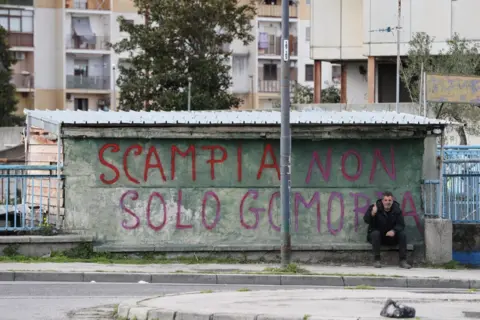 Getty Images
Getty ImagesItalian authorities started tearing down the “Sails” in 1998, although demolition was frequently halted by the discovery of asbestos.
A university campus has already been built where one of the “Sails” used to stand, and there are plans for a new kindergarten, cultural centre and park.
By the end of this year, only one building – Vela Celeste (Blue Sail), where Monday’s accident took place – is due to remain standing and will be repurposed into offices.
The city of Naples said earlier this year that the last “Sail” would stay in place “as a symbol of the past, of this neighbourhood and of the fight for redemption that this community has fought”.
The mayor of Naples, Gaetano Manfredi, said he was “profoundly pained by the tragedy” but added that the project to repurpose the “Sails” wouldn’t stop.
“Now is the time to hope for the [injured] children… and it’s for them that I want to repeat that our commitment for Scampia will be stronger than ever.”


